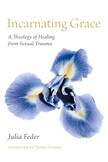Review: Theology and sexual trauma
Seeking to make theological sense out of experiences of human suffering is a daunting task. The Christian tradition nevertheless is littered with efforts to do so, ranging from the clichéd to the mystical. In truth, many of these efforts ring hollow—suggesting, for instance, that God actively permits suffering to punish human sin, or that God tests our character through suffering, or, worse, that suffering is a part of God’s overarching plan.
Nowhere are these theological formulations more problematic than in the context of sexual violence. Such violence is shockingly common in today’s society, and its effects are both terrible and far-reaching. Yet the sad truth of the matter is that far too many victims of domestic and sexual abuse have themselves been blamed, ignored or urged to suffer in silence; to stay in fundamentally unsafe relationships; or—perhaps most troubling of all—to maintain in faith that their suffering is somehow “salvific” in the mind and heart of a God who (supposedly) loves them.
This failure of Christian tradition toward survivors of sexual violence lies squarely in the crosshairs of Julia Feder’s powerful new book, Incarnating Grace: A Theology of Healing From Sexual Trauma. Feder insists, repeatedly and with courage, wisdom and, yes, grace, that the suffering of sexual violence serves no higher purpose—none at all. It is not in alignment with God’s will, and it is most decidedly not redemptive. Feder stands firm from beginning to end in her conviction that “it is only the posttraumatic healing process that is salvific.” Sexual violence can leave a survivor deeply wounded on personal, interpersonal, social, psychological and spiritual levels. Theologies that prop up or contribute to this woundedness, whether intentionally or unintentionally, must be soundly rejected.
Feder is not only concerned with rejecting dangerous theological projects that have misled (and mistreated) survivors; she is also keen to plumb the depths of the Christian tradition more positively, for resources that offer meaning, courage and hope. In her view, Christianity encompasses deep wellsprings to animate healing. To do the work of retrieval, she probes the writings of two theologians from entirely different historical eras: St. Teresa of Ávila, the 16th-century Spanish Carmelite nun; and Edward Schillebeeckx, O.P., the 20th-century Belgian Catholic theologian. In the work of these theological giants, Feder locates key underpinnings for her own extraordinary project: to articulate and call for a mystical-incarnational version of healing after sexual trauma.
Feder’s treatment of Teresa of Ávila invites us into a full-throated affirmation of the human person as fundamentally embodied. Why is this important to survivors? For starters, the body is ground zero as a source of struggle for someone who has undergone profound sexual trauma. Teresa’s affirmation that the body mediates the sacred, even as it simultaneously limits and constrains people, leads Feder to build conceptual connections with the “very real ambiguity that many sufferers feel about their bodies.” Such honest attention to reality joins with an accompanying invitation to the integration of body and soul that characterizes genuine intimacy with God.
In Feder’s analysis, this union can begin to counterbalance the severe bodily trauma resulting from assault. She understands that healing is not liberation from the body (the very body, in fact, that may have been assaulted); it is, rather, liberation of the body for loving friendship. Feder here articulates an anthropology that is both magnificent and highly relevant to survivors experiencing deep brokenness: “To know oneself authentically is to know oneself as undeserving of shame and radiant with beauty, despite whatever blame others place on us.”
Yet Feder is also quick to point out that Teresa’s framework at times treats suffering itself as an opportunity to grow more intimate with God. In Feder’s view, this possibility is alarming for survivors and one that we should resist. She cautions, “This tendency in [Teresa’s] thought can risk valorizing suffering itself as bringing about divine-human friendship and suggests that somehow suffering is desired by God for salvation. In a context of sexual violence, this is a risk that carries too high a price for survivors.”
In other words, Teresa does not get it wholly right. We require a contemporary thinker to correct this tendency, one who pays deep and sustained attention to human suffering without risking its reinforcement. Enter Edward Schillebeeckx.
Schillebeeckx is clear that God does not will human suffering nor use it as a tool for salvation. Suffering is real, and (highlights Feder) this imbues the survivor’s bodily experience with true revelatory power. But God is less present in the suffering than alongside the sufferer, as an “indignant witness” who remains closely present to the one who suffers.
Feder elaborates this understanding in terms of Schillebeeckx’s graced experiences of “negative contrast.” Quoting him, she notes that the fundamental human experience of a ‘“no’ to the world as it is” can reveal an “‘open yes’ [which] is the basis of that opposition and makes it possible.” It is in this “yes” that the survivor finds meaning and hope, sensing even vaguely how the world “ought to be.” The survivor is thus delivered back to herself, to the authenticity of her own experience, while simultaneously discovering a doorway forward into wholeness.
In a particularly beautiful chapter unpacking Schillebeeckx’s Christology, Feder elaborates further on how the mysteries of the atonement and Jesus’ resurrection can be retrieved for survivors of abuse. Here she calls Christians actively to resist suffering, through the lens of Jesus’ own suffering and death—a death he came to accept, but only (in Feder’s view) after realizing that it was unavoidable. She emphasizes that the power and triumph of God’s creative love is centered in the resurrection, with the cross representing not a valorization of suffering and death but rather “a memory of one who was raised.”
With this as her basis, Feder issues a renewed understanding of salvation as “the restoration of the whole human person as she was created to be.” The positive vision is both personal and social; healed persons, living in egalitarian relationships, are enabled in part by the communal denunciation of—and action to prevent, rectify and account for—sexual violence.
Feder finally spins out this mystical-political vision of post-traumatic healing in terms of the specific Christian virtues of courage and hope. Courage, as she understands it, is best understood as persistent endurance, a willingness to pursue the good of recovery even despite the severe trauma of sexual abuse. Eschatological hope animates and empowers the hard work of acknowledging and resisting sexual violence as well as dismantling rape culture; in other words, it enables us to expect that something difficult is nevertheless possible.
Writing eloquently of these qualities, Feder maintains, “Healing requires reserves deeper than those which can be articulated by the secular field of psychology alone. Healing requires hope solidly grounded in the genuine expectation that transformation is possible through God’s creative work and our free, creative, and courageous cooperation.” Indeed, rather than leaving us in despair before the horrors of sexual violence, Feder’s analysis here invites us into a brave and hopeful transformation, with a God who is wholly present alongside us.
Feder’s volume melds a long-overdue honesty about the brutal realities of sexual violence and rape culture with an imaginative vision, set forth in mystical-political terms, of “a future in which rape is unthinkable.” Her retrieval of the work of Teresa and Schillebeeckx lays solid groundwork for this vision. In places, Feder’s sometimes protracted descriptions—particularly of Teresa’s historical background and the metaphorical detail of her imagery—can tempt us to temporarily lose track of the proverbial forest for the trees. But that is a small (and perhaps rather refreshing) price to pay in order to mine the gems that Feder is able to extract from the work of this sometimes overlooked theologian.
In spite of her thoroughgoing retrieval of the theologies of these two great Christian writers, it is ultimately Feder herself who skillfully weaves their insights into genuine resources for survivors and their allies—as well as for society more generally. It is long past time that the Christian tradition honestly addresses the struggles of multitudes of survivors of sexual trauma. Feder provides a much-needed template for doing so, inviting us into a spiritual-religious understanding of post-traumatic recovery that is searingly honest on the one hand, but also visionary and deeply hopeful on the other.
This article also appeared in print, under the headline “Theology and sexual trauma,” in the July / August 2024, issue.











